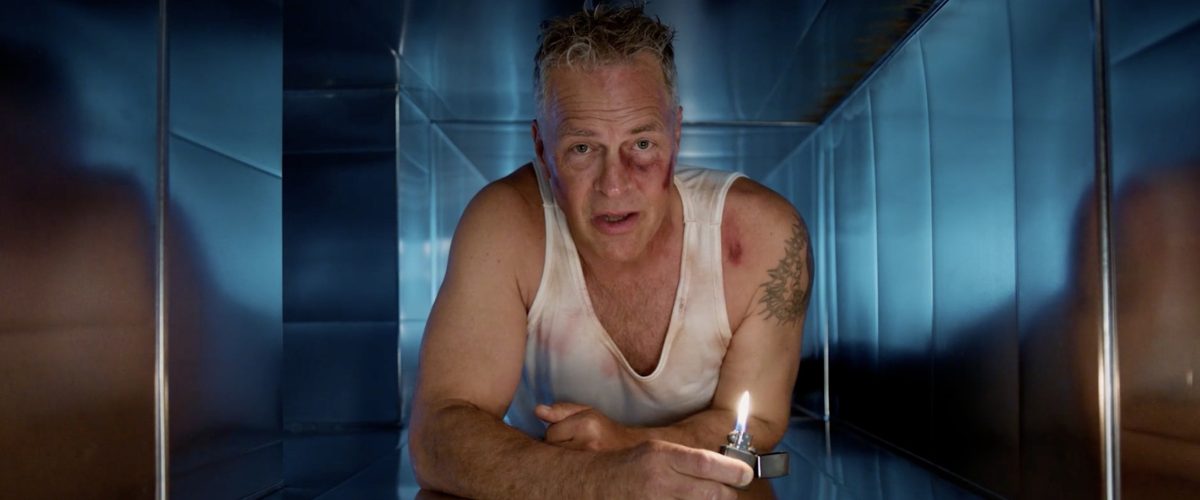“Christmas at the movies!” the pleasant, feminine voice sings as the smiley-faced popcorn, coffee, candy bar and soda cartoon characters come waltzing into the auditorium before getting interrupted with an explosion, heavy metal music, and a man yelling, “Don’t need that ring-a-ling, ding-a-dong, ding-a-ding talking. So if we see the glow of the cellular telephone, we’ll take ’em and we’ll break ’em and we won’t say we were mistaken! You’ve been warned! Merry Christmas!”
Suddenly, a dark figure is seen crawling through the vents. He reaches behind him, pulls out a lighter, and flickers the light to reveal himself wearing a bloody muscle shirt with scrapes and bruises on his face and shoulder. Then you realize who it is — Brian Tome, senior pastor of Crossroads Church in Cincinnati.
Tome is no stranger to dressing up like a manly man. He started an organization called Man Camp, where men get together to chop down trees, shoot slingshots, arm wrestle, throw bales of hay, start fires, ride motorcycles into lakes, and get yelled at from the pulpit. “It’s like jumping in a sketchy van and ripping away to freedom,” the website says. Tome also is host of a podcast called “The Aggressive Life.”
So of course, he’d be obsessed with the movie Die Hard.
“Let’s be really clear about something,” Tome begins. “Die Hard is a Christmas movie, OK? It’s a Christmas movie. There’s a Christmas tree in it, for starters. You got a guy fighting for his family. God fights for his family. It’s the family of God. You got a guy who’s willing to lay his life down for his family. That’s John McClane or Jesus. And you also have a gritty guy who’s had some real bumps and bruises in his life.”
Notice all the characters are gritty guys fighting.
Then he yells, “Yippie Ki Yay!” And breaks through the wall to the live stage, sits on the edge of the vent, pulls a cigarette out from behind his ear, takes a few puffs, and yells, “Man! God bless America! Smoking in church! Oh, how good it is!”
Then to kick off the Christmas season, Tome announces, “We are looking at the spiritual ramifications of Die Hard.”
Good News! It’s ‘the greatest story’
After playing the trailer filled with explosions, gunshots, car chases, men screaming and John McClane calling people “jerkweed,” Tome appears on stage sitting on a bar stool with his elbow propped up on his table pulpit while barefoot, donning a black leather jacket, and with makeup bruises still all over his face, ready to preach the word of God.
“Believe it or not, when I watch it, I see the message of God,” Tome says of the Bruce Willis classic. “For me, every time a movie moves me, it’s because the story of God is in the movie. And even if the writers, the producer, the director don’t know that they’re telling a story about God, the most moving things are about the character qualities of God and the greatest story ever told, which is true.”
Then he points out, “So as I watched this, I was moved by all the connections I was making, whether or not the writers made it or not, I was able to see them.”
Later, Tome calls this story the “good news.”
The Christmas season is one where churches hope to attract those who don’t normally attend church to their services and to convince them to become committed Christians.
While most white evangelical pastors won’t dress up like John McClane and smoke in church, they do offer the same essential message — that they’re an ideal community that celebrates good news by sharing the greatest story.
But if that’s the claim, then the rest of us reserve the right to evaluate whether the news and story are any good.
An unideal family situation
The first comparison Tome makes between the story of Die Hard and the story of Christmas is regarding the apparently unideal family situations of the central characters.
“This is an unideal family situation,” Tome suggests. “It’s not ideal that Mary gets pregnant before she gets married. It’s not ideal that Joseph is going to marry a woman that’s carrying a child that he didn’t father. That’s not ideal.”
Similarly, he says John McClane is not in an ideal situation because he and his wife are heading toward a divorce. He adds that divorce “doesn’t have the scarlet letter of shame anymore because it’s just so common. And this is not the way it’s been historically in America.”
Then Tome points out the moment when McClane notices his wife is using her maiden name rather than his. Tome says, “It’s a reminder to him that his family is not ideal.”
Notice how each of these examples center a heterosexual man. Mary gets pregnant prior to marrying a man, the baby isn’t Joseph’s, John McClane’s wife wants to divorce him, and she’s using her maiden name rather than his.
The distance and disgust of God
The next theme Tome explores is “the presence of sin,” which he calls, “A four-letter word no one wants to talk about.”
“Your sin disgusts him, your sin repels him. You want to be around stinky underwear? No. God doesn’t either.”
He tells the congregation: “You know why (God) feels so distant? It could be because he is, because your sin disgusts him, your sin repels him. You want to be around stinky underwear? No. God doesn’t either.”
It’s interesting to note how he locates God as “distant,” given how Paul spoke in Acts 17 of God being “not far from any one of us.” In fact, Paul’s claim that God isn’t far is likely humor or sarcasm, given how the next line says, “For in him we live and move and have our being.” In other words, for Paul, the non-Christians at Athens were as close to God as the human body is to the universe. That’s a completely different spiritual cosmology than Tome’s typical evangelical claim that God is distant because we’re repulsive stinky underwear.
Focusing on humility and shaming the sick
Because Tome frames the human condition as being stinky underwear that needs humility, he ends up shaming sick people by mixing up his stories.
“If I’m going to pray for somebody to get healing, I do that a lot, I very rarely ask somebody if I can pray for you, because that doesn’t lead to an effective ‘yes,’” Tome says. “The person has to initiate it.” He goes on to say the key ingredient to healing is “the humility of asking. The humility of reaching out and asking. But when we’re prideful, we’re unable to ask. When you’re prideful, you never ask someone to pray for you, you never admit you’re a sinner, you just can’t do some of the basic things.”
As the husband of a cancer survivor who doesn’t attend church anymore, this is quite a conflicting story to process. And it’s precisely why we wanted to face cancer without the supposed help of a local evangelical church.
“Why does a cancer patient need to make sure they have the proper humility and initiate any help they might get?”
Is Tome talking about physical healing or spiritual healing? If physical, then why does a cancer patient need to make sure they have the proper humility and initiate any help they might get? Was I supposed to wait until Ruth Ellen demonstrated the humility necessary to ask for my help as she laid on the couch after chemo?
Based on the conservative evangelical Calvinist theology of John Piper who informed how the Christians we knew thought of cancer, we knew we had family and friends who believed God gave Ruth Ellen cancer in order to get our attention to bring us to a point of humility and submission again. To them, the physical disease was meant to get our attention for our spiritual disease of not submitting to their theology.
So we never asked for help from a church. But it had nothing to do with pride. It was because we didn’t want to enter into the mind games of their glory hierarchy where we would have to make sure all our words were carefully chosen in hopes that God Most High might feel good about receiving the utmost glory from cancer patients. Instead, we considered the presence of God in and among the sick, not towering over us, but on the floor with us.
Lawbreaking or living out of embodied wounds
The fundamental problem with the conservative evangelical “good news” and “greatest story” is that they make no sense of our lived reality. In fact, they actually fuel the wounds we all live with.
According to Tome, Jesus “takes the punishment that I deserve because God is disgusted by my sin and disgusted by somebody who’s walking in sinfulness. Instead of taking it out on me, he transfers to Jesus.”
In other words, God the Father is a distant angry person who thinks we’re disgusting, dirty underwear and who makes things right by taking it out on people, either on us or on God the Son. So their gospel is an intergenerational Father wound. But intergenerational wounds are what all of us are embodying and longing for healing from. So it’s not good news at all to find out that God is doing the same thing, being angry and “taking it out on” people.
To “people who find this weird and archaic,” he admits, “I know it is.” But he adds: “And you find it that way, which is exactly why you don’t have peace right now, which is exactly why you don’t feel God, which is exactly why there’s no X factor in the power of your prayers, exactly why you don’t have peace that passes understanding! Because you’re operating on a wavelength that’s totally of the world and doesn’t work! And you need rescue. You need to be saved from that.”
An embodied God who heals
Because Tome frames our problem wrong, he gets God wrong. And because he gets God wrong, he frames our problem wrong.
“If our key deficiency was knowledge, God would have sent an educator. If our key deficiency was resources, God would have sent a banker. If our key deficiency was strength, God would’ve sent a personal trainer. But our key deficiency is sin. So therefore, God sent a Savior,” he says.
His logic makes sense. But he’s defining our “key deficiency” as a legal problem, rather than an embodied wound. So his solution is God the Father “taking it out on” Jesus. And then he appears to dismiss going to therapy. He says, “Not someone to help us work out our sin, and to go [to] counseling again and again and navel gaze on it, but to recognize for what it is, vulnerably turn from it, and have a Savior who saves us.”
But seeing a therapist who helps us work out our issues isn’t navel gazing. It’s becoming aware of the wounds we’ve been embodying and beginning to heal.
“It never ceases to amaze me how conservative Christian theology misses this point.”
It never ceases to amaze me how conservative Christian theology misses this point. Especially at Christmas, Christians could say, “But our key deficiency is a lack of awareness for the embodied wounds we’re living out of. So therefore, God became a body, experienced our wounds firsthand, subverted our assumptions of power that wound us, and offered the healing of forgiveness because we don’t know what we’re doing.”
Maybe Christians could even explore how the Gospels present Jesus actually healing bodies, rather than violently punishing them for being dirty, disgusting underwear.
A prototypical gospel
Despite Tome’s obsession with being a man’s man and living the aggressive life, he tries to prove the goodness of Christianity by showing how Jesus wasn’t like this during his life.
“He is not the prototypical savior, which is why many people have not received him, which is why the early Jews and many Jews today just have not received Jesus at all, won’t give him a second look for a Messiah or a Savior because he’s not what they want,” Tome claims. “They want a Schwarzenegger type who comes down and blasts all Muslim countries and people who are oppressing them and trying to put them down. They want somebody who just, you know, who just makes it right. And here comes Jesus in the first century. He doesn’t lead a revolt and crush Rome physically. He leads a revolt of love by laying down his own life on a cross. And many people just couldn’t fathom that, didn’t make sense with the Messiah they wanted. And today, doesn’t make sense of the Messiah they want. But that is who Jesus is.”
Setting aside his comments about Jews, his point about Jesus being totally different from empires and toxic masculinity could be good news. Imagine if God wasn’t like the most power-hungry and violent men among us.
Tome suggests: “Whenever you see a Jesus that’s all ripped, you are not seeing what Jesus looked like. Some of those cheesy Christian T-shirts that show Jesus bench pressing a cross, and he’s all ripped and veiny, no he wasn’t. There was nothing interesting about his physique at all. You never see him like chiseled face, amazing movie star looks. No, he wasn’t. Probably had pock marks from acne … unlike a classic savior in Hollywood.”
There’s a part of Tome’s humanity that knows deep within that good news is found in a God who becomes embodied in a way that subverts the empire’s power over others.
But then he totally undermines it by adding, “By the way, that form of Jesus is coming. It’s just the second time.” He adds, “He’s going to be in a different mode when he comes. That’s very, very clear in the Bible.”
In other words, the first time Jesus came was in a way we could recognize as good, while the second time he’s coming will look like everything toxic and violent our world has ever known.
Carnage at Christmas
As Die Hard ends, the snow falls with Christmas music playing. So Tome celebrates: “While there’s cacophony and carnage everywhere, they go out in peacefulness while a Christmas song is playing.”
This is exactly how conservative Christians imagine the end of the world to be. God “takes it out on” all nonevangelicals by tossing us into a giant volcano while stretched out on torture racks. Then evangelicals sing songs, exchanging their humanity for ignorance or violent delights.
And that’s the group of people Tome expects us to be attracted to this Christmas season, suggesting: “Maybe you’ve seen the reality of your sin and how you’re incapable of getting out of it. And maybe you’re seeing that there’s a family that you’d be welcome into. It’s an ideal family.”
An ideal family? Good news? The greatest story?
Reality check: If our story ends with white evangelicals singing Christmas songs amidst the carnage of their neighbors, those of us who love our neighbors as ourselves are probably going to respond with a paraphrased line from Die Hard’s Hans Gruber. “Alas, your nonevangelicals did not see it that way … so we won’t be joining you for the rest of our lives.”
Rick Pidcock is a 2004 graduate of Bob Jones University, with a bachelor of arts degree in Bible. He’s a freelance writer based in South Carolina and a former Clemons Fellow with BNG. He completed a master of arts degree in worship from Northern Seminary. He is a stay-at-home father of five children and produces music under the artist name Provoke Wonder. Follow his blog at www.rickpidcock.com.
Related articles:
The roaring comeback of a toxic masculinity of power and victimization | Opinion by Rodney Kennedy
Christian masculinity, culture and racism: An interview with Kristin Du Mez | Opinion by Greg Garrett
Guys, guns and gods | Opinion by Napoleon Harris






